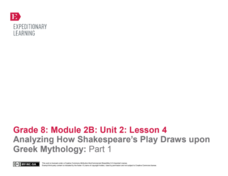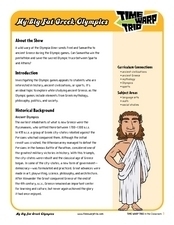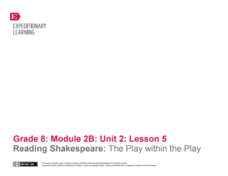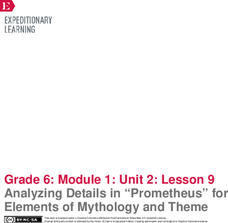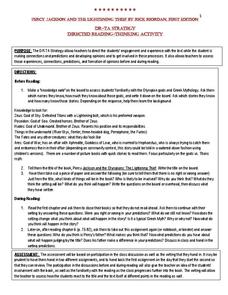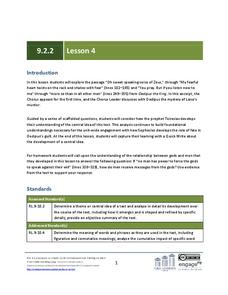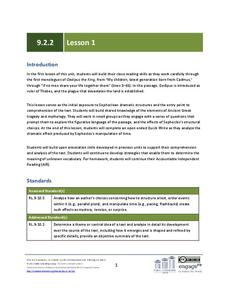EngageNY
Analyzing How Shakespeare’s Play Draws upon Greek Mythology: Part 2
Pupils explore the narrative structure of a piece of literary text, mapping out the plot structure of the Greek myth "Pyramus and Thisbe." Next, they use their completed graphic organizers to write story summaries.
EngageNY
Analyzing How Shakespeare’s Play Draws upon Greek Mythology: Part 1
Scholars read the story "Pyramus and Thisbe," analyzing word choice, tone, and meaning. They then try to find the gist of the story and discuss how Shakespeare used the myth in his play A Midsummer Night's Dream.
EngageNY
Analyzing How Shakespeare’s Play Draws upon Greek Mythology: Part 3
How do the narrative and play versions of the myth "Pyramus and Thisbe" affect meaning? Scholars reread Act 5, Scene 1 from Shakespeare's A Midsummer Night's Dream and compare its structure to "Pyramus and Thisbe." Next, they use a...
Time Warp Trio
My Big Fat Greek Olympics
The Olympic Games are indeed a significant and far-reaching cultural component in our international community today, but from where do they originate? Where do our traditions stem from, and how do we choose the sports that constitute...
EngageNY
Reading Shakespeare: The Play within the Play
Scholars continue reading the Greek myth "Pyramus and Thisbe," analyzing why it was written into Shakespeare's A Midsummer Night's Dream. Next, they complete a Venn diagram to compare the two texts.
EngageNY
Determining Theme: Reading Myths in “Expert Groups”
Leave it to the experts. Scholars work in expert groups to analyze new myths. Each group is assigned to become an expert on either The
Fates, The Story of Medusa and Athena, or Theseus and the Minotaur. They answer questions and...
EngageNY
Reading Closely to Build Background Knowledge: “Myths and Legends”
That is a myth! Scholars take a look at Greek myths referenced in The Lightning Thief. As learners listen to stories in Myths and Legends, they imagine the sights and sounds described. Pupils then talk with partners about specific words...
EngageNY
Exploring Allusions to Myths in The Lightning Thief: Close Reading Part 1 of “Prometheus”
It's all just an allusion. Scholars learn the meaning of allusion and read an allusion in The Lightning Thief. Learners gather in their triads and discuss questions from the text to take a close look at vocabulary words and choose...
EngageNY
What Makes a Myth a Myth? Comparing “Cronus” and “Shrouded in Myth”
Scholars complete a Venn diagram to compare and contrast Cronus and Shrouded in Myth. Learners work in their triads to write similarities and differences on sticky notes. They then take a look at the text The Key Elements of...
EngageNY
Leaving the Play: All’s Well That Ends Well
How does Shakespeare develop the theme of control in A Midsummer Night's Dream? Using the resource, scholars analyze the theme of parental control in the play and the Greek myth "Pyramus and Thisbe." Next, they talk to partners to...
EngageNY
Analyzing Details in “Prometheus” for Elements of Mythology and Theme
Well isn't that clever? Scholars read Prometheus, a tale describes the clever Greek god and trickster. They tune into details and complete graphic organizers that reveal the theme of the text.
EngageNY
Connecting Literary and Informational Texts: Cronus and “The Key Elements of Mythology”
Is there a connection? Scholars work to make connections between Myth of Cronus and The Key Elements of Mythology. First, they circle important words in the text and look for similarities. They then revisit the concept of theme and...
EngageNY
Building Background Knowledge: The Myth of Cronus
Scholars look at and describe a picture of Cronus and Rhea and discuss the process of making predictions. Learners then use the images to write a prediction about the myth of the gods on an index card before completing guided...
EngageNY
Using Details to Determine Theme: The Myth of Cronus
There's nothing like a good theme! After reviewing the story of Cronus, learners participate in a mini instructional activity about theme by pulling papers from an envelope and identifying the writing on it as either a topic or a...
EngageNY
Building Vocabulary: Working with Words about the Key Elements of Mythology
Build vocabulary one word at a time. Scholars work to create word models to describe the key elements of myths. After viewing and discussing glossaries, they begin working in triads on their models that include the word, synonyms,...
Curated OER
The Lightning Thief: Directed Reading-Thinking Activity
Before diving into the engaging tale of Percy Jackson and the Lightning Thief by Rick Riordan, conduct this directed reading and thinking activity. Assess your pupils' knowledge of Greek gods and mythology through a knowledge web,...
EngageNY
Grade 9 ELA Module 2, Unit 2, Lesson 4
The concept of sight, whether it's a lack of sight or abundant sight of the future, plays a vital role in Sophocle's Oedipus the King. Develop your ninth graders' literary vision with a lesson that connects the prophecy of Teiresias to...
EngageNY
Mid-Unit 2 Assessment: Analyzing Narrative Structure and Author’s Craft: Part 1
Using the resource, scholars complete a mid-unit assessment to gauge their learning at the halfway point of the unit. Pupils read the myth "The Harvest That Never Came" and plot its narrative structure.
Novelinks
The Lightning Thief: Concept/Vocabulary Analysis
Before you begin reading Percy Jackson and the Lightning Thief by Rick Riordan, read over this comprehensive handout that gives you a plethora of information regarding the story's summary, organizational structure, central...
Curated OER
The Lightning Thief: Vocabulary Strategy
Take an in-depth look into the vocabulary from the novel, Percy Jackson and the Olympians: The Lightning Thief by Rick Riordan. With a list of words to choose from, scholars discover the definition, origin, stories associated with...
EngageNY
Grade 9 ELA Module 2, Unit 2, Lesson 1
Delve into the heart of dramatic dialogue with a unit focused on Oedipus the King by Sophocles. Having completed an online exploration about ancient Greece beforehand, ninth graders read the play's opening lines and analyze how...
KIPP 3D Academy
Epic Poetry Unit
The Odyssey is the core text in this unit study of the hero's journey motif. Along the way, kids research Greek and Roman history, mythology, art, and epic poetry. The 104-page packet is perfect for homeschool or classroom situations and...
Novelinks
The Lightning Thief: Problematic Situation Strategy
In the novel, Percy Jackson and the Olympians: The Lightning Thief by Rick Riordan, Percy is faced with a major decision. After reading, chapter 19, discuss the decision-making process Percy took, what he decided to...
Newspaper in Education
The Iliad: A Young Reader Adventure
Is The Iliad part of your curriculum? Check out a resource that offers something for those new to teaching the classic and those with lots of experience using Homer's epic. Plot summaries, discussion questions, activities abound in...



